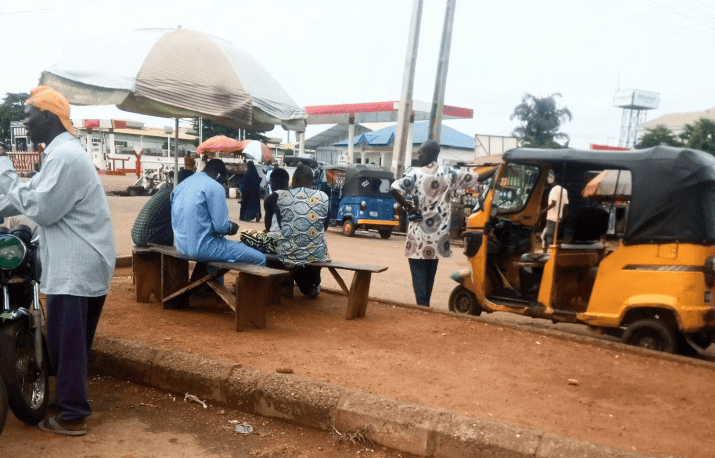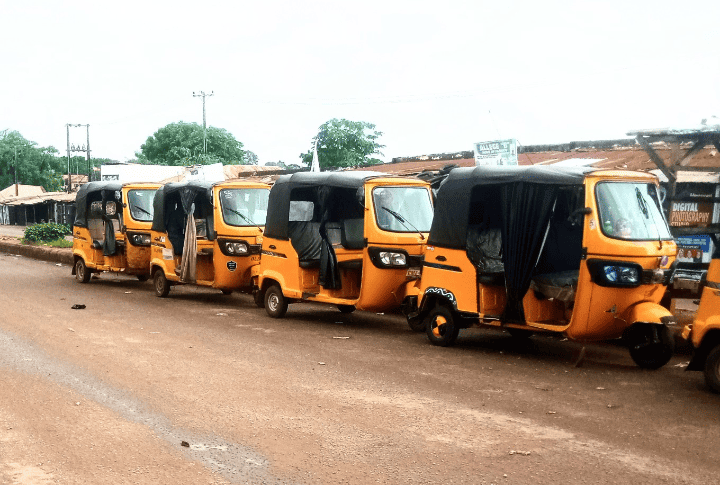On a typical Saturday, keke tricycles would thrum with activity at the Mandate branch in Ilorin, Kwara state. But the tricycles, or ‘kekes’ as they’re locally known, stayed idle in a forlorn queue. The absence of passengers is not due to a lack of service; it is the sound of economic hardship resonating through the streets of Ilorin, amplified by security restrictions on operating hours.
Bolaji Atunwa, the branch secretary, and other keke riders, shifted uncomfortably on plank benches, as the Agbero (passenger caller) fervently tried to convert passersby into paying customers.
“There are no more passengers during the day as a result of the economic hardship; people now prefer to trek to their destinations instead of carrying a tricycle,” lamented Atunwa.
Keke riders in Ilorin used to smile to fortune in the night, shuttling late commuters who felt less secure walking home. That was until security measures put an end to their night-time operations. State government has since last year banned all tricycles from operations between 9:00pm to 6:00am. According to Atunwa, any violator would find his tricycle impounded and pay a minimum of N5000 to recover it.
“It’s a pity when I see passengers stranded beside the road in the night when I am rushing home and unable to stop and shuttle them,” said Atunwa.
In recent years, Kwara State has faced several security challenges. Abduction became convenient for perpetrators using tricycles. According to a DAILY TRUST report, two women and a teenager shuttling in Keke Napep were abducted in November 2022. The operatives of the Nigeria Security and Civil Defence Corps (NSCDC) later rescued the abductees. Booming of the similar attacks brought about restriction of motorcycle and tricycle operation between 9p.m to 6a.m across the state.
Though the Keke riders are convinced the restriction is meant to protect not only the passengers but also their jobs, as the stereotype of tricycle riders being kidnappers would be avoided, however, the curfew is taking a toll on their incomes.
Laying down in a tricycle tired was Olaiya Rasaq, a father of three, who operates tricycle to cater for his family. While he has survived several other economic downtowns in the past five years as a Keke rider, he said he has never experienced a tough time like this.
On this day, has been shuttling back and forth but yet to earn what he expends to fuel his tricycle per day, he revealed. Since the restrictions, he barely earns enough to cater for his family.
“Days like today that no money remains for me after paying daily due to the Keke owner, I have to work beyond 9p.m so that I can take money home for my family,” said Razaq.
Everytime he works past the restricted hour, Razaq said he avoids roads where policemen are stationed.

Razaq’s colleague, Aileru Saheed, 30, blames his current economic situation on the time restriction placed on the tricycle operation. Before the restriction, he recounted, his debts are always paid before the due date. Now, he is indebted in many places that the payment periods are overdue. Sometimes, he said, his creditors would knock on his door early in the morning—as soon as the day breaks, knowing he would leave for work, to demand payment.
Because of his situation, Saheed said he withdrew from all group contributions, and at the moment does not possess any savings anywhere.
“Had it been we are allowed to operate adequately without any restriction, I would have gathered money to settle my debts and have a free mind,” bemoaned Saheed.
“We are not comfortable with the law, it’s just that the government cannot be challenged,” he said. “There are always passengers in the night, especially those working in a place far from their houses. We couldn’t carry them due to the time frame. The government should consider and favour us by extending the time to 10p.m or 11p.m.”
In an interview with Hon. Rafiu Ajakaye, the Chief Press Secretary to the executive governor of Kwara state, he reiterated the restriction is for security reasons and recommended this reporter speak with the Police in the State for more information.
The Police Public Relations Officer (PRO) of Kwara State command, SP Ajayi Okasanmi, explained that the directive that imposes 9:00pm – 6:00am curfew on the tricycles is a state government’s decision to protect the people living in the state.

“The police job is to enforce the law as it may be given either by the federal or state government and that is exactly what we are doing.”
SP Okasanmi said if a group of people are affected by the enforcement of the restriction, they would need to channel the complaints to the government who can amend the policy.
As keke riders navigate through the intertwined roads of economic struggle and security concerns, their quest for a sustainable livelihood hangs in the balance.
Atunwa, the Keke riders’ branch secretary, made the plea. He said the Tricycle Owners Association of Nigeria (TOAN) are designing methods to distinguish themselves from the criminals who use tricycles to perpetrate crimes, and that the government should work with them and extend the restriction time.
One of the measures TOAN is putting in place is the issuing and pasting of the association’s logo in front of their members’ tricycles, and going on radio to sensitise people to lookout for this logo on tricycles before shuttling.
“Though the time restriction helps to safeguard the integrity of our job, it’s affecting our income and likewise it is affecting the masses,” said Atunwa.













